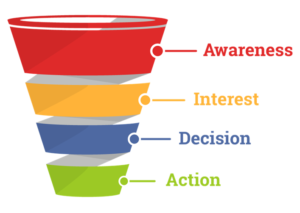Last week I was tagged on a LinkedIn post that posed an interesting question. It read, “If someone credibly tells you that a subset of your active annual giving donors has a high chance of lapsing, what do you do next?”
I never responded to the post, but I’ve been thinking about it continuously. “How would I go about retaining those soon-to-be lapsed donors?” I found myself thinking in the shower. I officially had the “bug” and needed to come up with a solution.
Understand why donors lapse

Before I came up with my strategy to retain lapsed donors, I had to put myself in the shoes of a lapsed donor. This was easy, because I am one.
This past weekend I started filing my taxes for 2018. In doing so, TurboTax reminded me of all the charitable contributions I made in 2017. Who knew it would be so easy to empathize with a lapsed donor? I am a lapsed donor!
In 2017 I donated close to 6% of my adjusted gross income to a handful of organization. A 2014 Chronicle of Philanthropy study found that Americans donated 3% of their income to charity. To suggest I was doing my part in 2017 would be accurate.
However, in 2018 I didn’t donate to any of the charities I gave to in 2017. I donated closer to 4% of my adjusted gross income (again, a fair amount), but not a single dollar went to any of the causes I contributed to in 2017. As a fundraising professional, I imagine you are currently scratching your head.
Let me explain my rational, and consequently, the rationale of a lot of lapsed donors…
My giving process looked something like this:
- Something meaningful happened in my life and I felt a connection to a particular mission;
- I researched organizations and found one that aligned with my needs and wants;
- I donated to the organization, and it made me feel better about the situation I was going through;
- The organization thanked me, sent me a few solicitations, and reminded my of how awesome they are throughout the year;
- I didn’t give to them again this year.
It’s not rocket science. A lot of people, myself included, give once and move on. That’s part of annual fundraising — finding the right people who have a connection to your organization at the right time, and making sure they get a solicitation so that they give again this year. For a lot of lapsed donors, year 2 comes around, and guess what? No monumental moments have happened that connect them to your cause. As a living, walking, and breathing lapsed donor I can confidently say I’m not going to donate to the annual fund again. Am I still going to be philanthropic? Yes! Instead of those dollars going to you, they’re going to go to other causes that are top of mind right now.

“Top of mind right now.” That phrase should hopefully stand out to you. We all know that effective marketing moves an individual through the AIDA funnel (awareness, interest, desire, action), but having the right collateral in front of the right person at the right time is undoubtedly difficult.
So, at least in this case of the lapsed donor, you don’t have too much control. “How can I be expected to get someone to renew if they don’t care about us this year?” You might find yourself asking. On the surface, I’m right there with you, it sounds like an impossible task, however that’s exactly where my simple strategy comes in…
How to retain lapsed donors

It wouldn’t have been easy to retain my donation this year, but every organization I contributed to in 2017 could have brought me back. Let’s use Massachusetts General Hospital (MGH) as an example. I wrote in depth about my experience donating to the hospital after my mom died there in 2017, and I obviously have a close connection to the organization because of that. It’s important to recognize however, that I did not donate to MGH in 2018 for the exact reasons I outlined above (they weren’t top of mind at any point in 2018).
What would have been an effective strategy to get me to retain my contribution? It would have been to…
Learn about why I donated in the first place
Step number 1 in my simple “don’t lapse” strategy is critically important. Without it, you don’t have steps 2 or 3, and without those you don’t have a retained donor. When it comes to your supporters, you need to know why each and everyone of them is donating to your organization.
Learning why a supporter is a supporter may seem trivial, “We’re a humane society, they donate because they love pets,” you could find yourself saying. That’s not good enough. Why do they love pets? Did they recently have to put a pet down and that’s what spurred them to donate?
If you don’t find yourself asking, “Why? Why? Why?” you’re not doing it right.
Getting the intimate details of why a supporter donated is of the utmost importance. However, at scale, it can be challenging. I highly recommend surveying your constituency throughout the year and asking this very question, “what brought you to XYZ organization?”
More on how to do that can be found here.
Document it
You’ve heard me preach it on this blog before, capturing data is one half of the challenge, the other is leveraging it. In this case, the data we are dealing with isn’t quantitative, it’s qualitative. We need a way to capture and organize the stories, passions, and interests of your supporters. How can you do that?
Solutions range from handwritten notes and Excel spreadsheets to robust 5 figure CRM systems. Whatever you have at your disposal, use it. If you want to implement this strategy it is critically important that you keep track of two pieces of data; the why and the when.
Why did the supporter donate (what was their meaningful life event that brought them to the cause?), and when did that event happen? The when is important for timing your pre-lapse engagement, the why is obviously important because it represents the talking points you’ll use in your communication with the supporter.
Remind me of that event and reinforce how supporting your organization makes me feel better
Step 3 in our strategy is simple… remind me of why I donated in the first place. I fondly think back to the week I spent sleeping on a cot at Mass General with my mom nearby. If in June of 2018 I received a note from someone at MGH reminding me of my struggle, how meaningful it was for me to be there, and how the hospital was there to support me, they would have had my attention. Would I have donated? Who knows, but would they have had a better chance at retaining me? Absolutely.
In theory what I am proposing here is simple. In practice, it’s incredibly challenging and complex. Don’t let perfect be the enemy of good. Sending handwritten emails and notes is NOT FUN, but, the question was, “If someone credibly tells you that a subset of your active annual giving donors has a high chance of lapsing, what do you do next?” and this is exactly what I would do.
Applying this at your shop
What’s the key takeaway from today’s post? That retaining donors is not easy. I might make it sound easy above, but we all know it isn’t.
Learning about a constituents “why” and also knowing their “when” will provide any fundraiser with the ammunition they need to effectively try and stave off donor attrition. Implementing my suggestions above will be tough, but there is a reason why companies like ours exist — to help get these ideas into action.
If you’re interested, click here to meet with someone on our team to talk about how we might be able to help.





